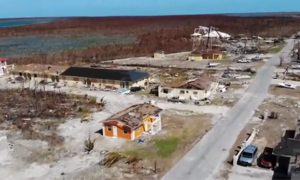News
Gaming and Crime Bill Pass in the House
Published
11 years agoon

The Bahamas, 19th Sept 2014 (Bahamas Information Services) – It is official. Webshop gaming in The Bahamas is no longer an underground industry but a fully regulated $600 million component of both the domestic tourism and financial services sector product offerings. Late Monday evening, 25 Parliamentarians voted yes, seven voted no and five were absent at the third and final reading, committal and vote on the historic Gaming Bill and attendant regulations that promised to transform the gaming industry, both land based and online.
Defending the government’s decision to legalize and regulate this industry in the best interest of The Bahamas and responding to his critics, Prime Minister Christie said that it was important not to “attribute to one side sin, corrupt practices, when they are motivated to do….what all of the agencies of the world would reasonably expect them to do in the circumstances.” The Prime Minister was referring to concerns raised by the Governor of the Central Bank and the Compliance Commission about the unregulated gaming industry. These concerns were raised after the January 28, 2012 gaming referendum.
The Prime Minister was emphatic in his position that “no government faced with the information this government was faced with…could arrogate unto itself the right to say, ‘let’s ignore that.’ This now… becomes a major matter for the Minister of Finance and Prime Minister of The Bahamas and that’s me.” The Prime Minister was referring to an external review and national risk assessment of The Bahamas’ economy by an anti-money laundering taskforce from the Caribbean Financial Action Task Force (CFATF) scheduled for 2015. The numbers industry must be a part of this risk assessment said the Prime Minister and the government will liaise with all financial industries in the country to determine areas of vulnerability.
“Fostering growth, transparency and social responsibility comes as The Bahamas faces in 2015 a more thorough external review by CFATF than it has ever faced before. A review as to risk and areas of vulnerability in our economy” said the Prime Minister, referring to an October 2013 article published by one of the dailies about this extensive and thorough national audit of the country’s economy by the CATF in 2015. Legalizing and regulating the numbers industry was the correct and reasoned policy decision for any responsible government, given the circumstances facing The Bahamas argued Prime Minister Christie.
The Prime Minister went further in hammering home the principal of probity which is the fundamental cornerstone of any credible gaming dispensation:
“The most fundamental cornerstone of any credible gaming dispensation anywhere in the world can be distilled into a single word. That word is “probity”. Probity focuses on establishing that any given person who seeks to be involved in the gaming industry, whether as a regulator or as a licence holder, is fit and proper to do so, and moreover remains fit and proper on an ongoing basis. The currency of probity is therefore information concerning the relevant individual, ranging from information regarding the personal history of that person, or business history, where that person is a corporate entity, to information relating to the financial history, capacity and dealings of that person, as well as criminal history and associations with other persons.” The Prime Minister was confident that a fully regulated Bahamian gaming industry would pass the universally acceptable credibility litmus test of “probity.”
Turning his attention to the taxes, fees, penalties and social and community contributions with respect to gaming houses, the Prime Minister had this to say:
1. “As provided in section 85 subsection (16) of the Gaming Bill, after making a full and frank disclosure of all turnover and gross profit generated by the conduct of their businesses as defined in the Business Licence Act, for a period of six years for businesses which were in operation for six years or more, or from the date of start up for those operations who were in business for a lesser period than six years, make payment in full of:
(i) All fees payable under the Business Licence Act for the review period, to the extent that any turnover or gross profits generated by the conduct of such business had not been disclosed.
(ii) All gaming taxes which would have been payable by that business had such business been licenced under the Gaming Act, calculated at the prescribed rate commencing on 1st July, 2014.
(iii) A penalty in the amount of
(a) $350,000 in respect of a business with a gross turnover of less than five million dollars; and
(b) $750,000 in respect of a business with a gross turnover of less than give million dollars.
2. Payment of the licence fees set out in Regulations 49-55 of The Gaming House Operation Regulations, 2014
3. As prescribed in Regulation 57 of the Gaming House Operator Regulations 2014, payment of gaming taxes whichever should be the greater of —
(a) 11% of taxable revenue
(b) 25% of earnings before interest, taxes, depreciation and amortization.
4. Regulation 57 of the Gaming House Operator Regulations 2014 also provides that the tax should be subject to review—
(a) During the transitional period following the receipt of the RFP and audited financial statements;
(b) At such time as the Minister may otherwise direct.
5. In accordance with Regulation 4 of the Gaming House Operator Regulations, 2014 the RFP may require gaming house operators to make monetary contributions of a minimum of 1% for corporate social investments initiatives and 1%for community improvement.”
Amended Crime Bills passed in the House
The compendium of crime bills intended to improve the administration of justice was passed in the House on Wednesday, 17th September 2014. They were:
· Bail Amendment Act
· Coroners Amendment Act
· Evidence Amendment Act
· Abolition of the Mandatory Minimum Sentence
Under the amended Bail Act, the burden is now on the bail applicant to prove why the court should grant bail and the court must now take into account the safety of the victim in its consideration to grant bail.
Under the amended Coroners Act, the Coroner is empowered to make homicide findings. The amended Evidence Act basically allows a witness to provide testimony via live television link. The conditions are when a witness is on another island; when being present in court creates fear and distress on the witness and when the court of trial considers it appropriate on its own motion.
The minimum mandatory sentences were abolished for possession of drugs, firearms and ammunition and judges are given judicial discretion in each case. Recently, Justice Jon Isaacs ruled that a 4-year mandatory minimum sentence for drug possession with the intent to supply was unconstitutional.
In passing
The Referendum date delayed to 2015; the CBTUC called off strike and returned to work this past Monday amid continuing negations with the government and the General Education Diploma program (GED) was launched by the government this week through a partnership between Atlantic College and the Urban Renewal Commission.
The Antiquities, Monuments and Museums Corporation (AMMC) and the Bahamas Mortgage Corporation (BMC) both inked new labour agreements with the Bahamas Public Service Union; new immigration rules announced in the House and the once stolen and returned Bahamian Iguanas are released to the wild.
The Clifton Heritage Authority will host the media this evening at the Hilton; Bimini gets a new ferry passenger port and more job opportunities; Prime Minister Christie tours the Grand Bahama Shipyard today and the HMBS Leon Livingstone Smith, the third of nine new patrol vessels for the RBDF to be commissioned at 6:30 pm this evening at the Kelly Dock.
—
Elcott Coleby
Deputy Director
Bahamas Information Services
326-5833
477-7006
Magnetic Media is a Telly Award winning multi-media company specializing in creating compelling and socially uplifting TV and Radio broadcast programming as a means for advertising and public relations exposure for its clients.

You may like
-


Bahamas Ministry of Health addresses news headline about ‘CoVax’ for children
-


New COVID-19 Initiatives to Curb Rise in Bahamas Family Island Cases
-


Turks and Caicos Fishermen rescued at Sea
-


Bahamas National Security Minister Lauds Contract Signing for Police Body and Dash Cams
-


McClean’s Town Conch Cracking interrupted by Hurricane Dorian
-


Bahamian music legend gunned down at home in Turks and Caicos
News
Commonsense, Not Confrontation: Why Kamla Persad-Bissessar Is Right
Published
1 month agoon
December 27, 2025
This debate did not start with Donald Trump, and it did not start this month.
For more than a decade, this reporter has had a front-row seat to repeated, urgent calls from across the Caribbean for stronger intervention by the United States in response to gun- and narcotics-fuelled violence that has hollowed out our communities. Long before today’s headlines, leaders warned that transnational gangs were outgunning police, draining public resources and stealing our youngest people.
Much of the public messaging leaned toward calls for fewer guns flowing from the United States, but the practical response from Washington evolved into something else: tactical undergirding of the Caribbean. Training, intelligence sharing, maritime surveillance and joint operations expanded under successive U.S. administrations — Republican and Democrat alike.
Then came Venezuela.
President Nicolás Maduro proved himself an unhinged and destabilising force, openly threatening Guyana’s oil-rich territory and pushing the region to the brink of a conflict no Caribbean state could afford. The United States showed up. The threat of war was blunted. That mattered.
But while geopolitical flames were contained, the narcotics trade exploded.
CARICOM convened emergency meetings on transnational gang violence. Crime became so pervasive that it was formally classified as a public health threat. Entire communities were terrorised. Courts clogged. Police forces stretched beyond capacity.
And now — quietly but noticeably — the tempo has shifted.
While no single forensic study can capture the full picture, it is easily verifiable on the ground that major narcotics busts and trafficking activity have slowed in recent months. Something has changed. Pressure works.
This is the reality Prime Minister Kamla Persad-Bissessar is responding to.
Her critics accuse her of breaking ranks. What she is actually doing is refusing to indulge in strategic hypocrisy — demanding international help to confront narco-terrorism while appearing to defend or excuse the very networks and actors we have spent years condemning.
Sovereignty is not an insult. The Caribbean invokes it constantly. To deny it to the United States — especially when the policies in question were telegraphed months in advance and remain adjustable — is not diplomacy. It is posturing.
What is most troubling is the region’s selective memory. CARICOM has directed months of rhetorical fire at Trump-era policies, yet when disaster struck — from security crises to Hurricane Melissa — the United States remained one of the region’s most reliable supporters. Outcomes matter more than allegiance theatre.
Kamla Persad-Bissessar is not suffering from Trump Derangement Syndrome. She is applying commonsense statecraft. She understands that small states do not gain leverage by moral outrage alone, and that credibility is lost when we appear aligned with individuals, regimes or activities we ourselves have deemed a threat.
Her warning to CARICOM is simple and necessary: do not undermine your own cause.
The Caribbean’s fight against narco-violence, corruption and instability has been long, costly and painful. If pressure is finally producing results, we should be wise enough to recognise it — and brave enough to say so.
Angle by Deandrea Hamilton. Built with ChatGPT (AI). Magnetic Media — CAPTURING LIFE.
News
Beaches Turks and Caicos Showcases and Supports Local Creativity
Published
5 months agoon
September 12, 2025
September 12, 2025
PROVIDENCIALES, Turks & Caicos Islands – The Turks and Caicos Islands are home to a wealth of creativity, from artisans and craft vendors to musicians and performers. Beaches Turks and Caicos, the Caribbean’s leading all-inclusive family resort, has pledged its continued support for these individuals by providing meaningful platforms for them to share their skills and stories with guests from around the world.
The resort’s commitment is most evident in its weekly Cultural Night showcase, where visitors are immersed in the vibrant traditions of the islands. Guests enjoy live performances which feature local music genres such as ripsaw, while artisans display and sell handmade creations. This event not only enriches the guest experience but also strengthens economic opportunities for local entrepreneurs.
Entertainment Division Manager Garett Bailey emphasized the significance of Cultural Night, “we want to showcase everything the Turks and Caicos Islands culture has to offer. Our goal is for guests to leave with a deeper appreciation of the island’s art, music and traditions, while giving local talent the opportunity to share their creativity with visitors from across the globe.”
Beyond Cultural Night, Beaches Turks and Caicos also welcomes local craft vendors onto the resort every Wednesday and Friday where they are offered a direct space to market their goods. Guests have easy access to the Turks and Caicos Cultural Marketplace, where they can purchase authentic local arts and crafts.
where they are offered a direct space to market their goods. Guests have easy access to the Turks and Caicos Cultural Marketplace, where they can purchase authentic local arts and crafts.
Managing Director, James McAnally, highlighted how these initiatives reflect the resort’s broader mission, “we are committed to celebrating and sharing the vibrant culture of these islands with our guests. By showcasing local artistry and music, we not only provide entertainment but also help sustain and grow the creative industries of the Turks and Caicos Islands. From our cultural showcases to nightly live music, we are proud to create authentic connections between our guests and the people of these islands.”
Local musician Keon Hall, who frequently performs at the resort, expressed gratitude for the ongoing partnership, “being able to share my music with Beaches’ guests has created lasting relationships. Some visitors return year after year and request songs from previous performances. This partnership continues to celebrate what we do and strengthens the bond between local artists and the resort.”
The resort’s support of local artisans and entertainers extends beyond business opportunity; it is about preserving heritage and sharing stories. Guests take home more than souvenirs; they leave with experiences that deepen their understanding of Turks and Caicos’ culture and history.
Public Relations Manager, Orville Morgan, noted the importance of this commitment, “for many visitors, these interactions represent their first genuine connection to the Turks and Caicos Islands. From artisans and musicians to farmers and transport operators, our local talent helps shape every guest experience. At Beaches, we are proud to give them the stage to share their stories and their heritage.”
Beaches Turks & Caicos remains dedicated to developing cultural connections and supporting the artisans, musicians and entrepreneurs whose creativity makes the Turks and Caicos Islands unique. Each guest experience is an opportunity to celebrate and sustain the spirit of the islands.
Caribbean News
“Barbecue” is Cooked! US Turns Over 11 Million Haitians into Potential Informants with $5 Million Bounty
Published
6 months agoon
August 12, 2025
August 12, 2025
The United States just set fire to the underworld in Haiti — and this time, the smoke might finally flush out the man many call the most feared in the Caribbean.
On Tuesday, the U.S. government slapped a $5 million bounty on the head of Jimmy “Barbecue” Chérizier, the ex-police officer turned gang boss accused of orchestrating massacres, torching neighborhoods, and strangling Haiti’s capital into chaos. This isn’t just a headline — it’s a full-blown game-changer.
turned gang boss accused of orchestrating massacres, torching neighborhoods, and strangling Haiti’s capital into chaos. This isn’t just a headline — it’s a full-blown game-changer.
That kind of cash — offered under the State Department’s Transnational Organized Crime Rewards Program — is enough to turn the country’s entire population, more than 11 million people, into potential informants overnight. Add the millions in the Haitian diaspora, and Chérizier isn’t just wanted. He’s surrounded.
The Number That Changes Everything
Five million U.S. dollars today equals about 655 million Haitian Gourdes. In a country where many scrape by on less than $5 a day, that’s not just life-changing — it’s life-defining. It’s enough to rebuild homes, put generations through school, or buy a one-way ticket far from the gunfire.
In a place where trust is scarce and survival is everything, that figure is more than tempting — it’s irresistible. For Chérizier, it means every friend could be a future informant, and every loyalist might be calculating the cost of staying loyal.
‘We Will Find Them’ — Jeanine Pirro, U.S. Attorney
Jeanine “Judge Jeanine” Pirro, the U.S. Attorney, set the tone with fire in her voice. “This indictment is the first of its kind,” she announced. “Jimmy Chérizier, also known as ‘Barbecue,’ is a notorious gang leader from Haiti who has orchestrated and committed various acts of violence against Haitians, including the 2018 La Saline attack in which approximately 71 people were killed. He both planned and participated in that massacre.
“Anyone who is giving money to ‘Barbecue’ cannot say, ‘I didn’t know.’ They will be prosecuted, and we will find them. They are supporting an individual who is committing human rights abuses, and we will not look the other way.”
Pirro wasn’t just going after Chérizier. She was sending a warning to the Haitian diaspora accused of feeding his war chest from abroad: the days of claiming ignorance are over.
‘No Safe Haven’ — Darren Cox, FBI
Then came Darren Cox, Deputy Assistant Director of the FBI, delivering the muscle of America’s most powerful investigative force. “There is no safe haven for Chérizier and his network,” Cox declared. “We are closing every link, every cell.” Since January, he said, the FBI has arrested three Top Ten fugitives, taken more than 19,000 criminals off the streets, and seized thousands of tons of narcotics — enough to save millions of lives across the U.S.
The FBI’s Miami and Houston offices have already bagged one of Chérizier’s Viv Ansanm associates inside the United States without firing a shot. “These efforts are a deliberate and coordinated plan,” Cox said, “to protect our communities and confront escalating threats from terrorist organizations like Viv Ansanm.”
‘Three-Year Investigation’ — Ivan Arvelo, HSI
Ivan Arvelo, Assistant Director of Homeland Security Investigations, brought the receipts. “This is the result of a three-year investigation into Chérizier’s procurement networks, cash pipelines, and operational financing that violates sanctions,” he explained. Arvelo described 400 structures destroyed, entire communities erased, and a gang exploiting U.S. dollars, technology, and immigration loopholes to keep its killing machine running. “We tracked how Americans unwittingly bankrolled brutality,” he said — proof that the net is tightening both inside Haiti and abroad.
‘The Worst of the Worst’ — Chris Lambert, State Department
Chris Lambert, representing the State Department’s International Affairs division, gave the political bottom line.
“Mass violence in Haiti must end,” Lambert said. “The instability resulting from Chérizier’s actions fuels illegal migration, regional instability, and transnational crime. We will continue to apply every tool available — including our rewards programs — to stop the spread of unchecked violence, especially to target the worst of the worst criminal leaders threatening the people of our hemisphere.”
instability, and transnational crime. We will continue to apply every tool available — including our rewards programs — to stop the spread of unchecked violence, especially to target the worst of the worst criminal leaders threatening the people of our hemisphere.”
Lambert confirmed what many have long known: Chérizier is not just a gang leader. He commands Viv Ansanm, officially designated in May as a Foreign Terrorist Organization. In the eyes of the U.S., that makes him not just Haiti’s problem — but everyone’s.
Why Haitians May Not Resist
In Haiti, money talks — loudly. And when you put 655 million Gourdes on the table, it shouts.
That’s the kind of figure that turns casual acquaintances into informants and makes even the most hardened loyalist wonder if the payout is worth more than the risk. It’s not a matter of “if” word gets out, it’s a matter of “who will be first to collect.”
For grieving families, it’s a chance at justice. For the desperate, it’s a chance at survival. For Haiti as a whole, it’s hope — wrapped in the most dangerous of temptations.
An Answer to Prayers
For years, Haiti’s headlines have been a scroll of horrors — kidnappings, executions, burned neighborhoods, bodies in the streets. Chérizier’s name has been attached to too many of them.
This move by the U.S. isn’t just strategy. It’s personal. It’s a signal to every Haitian — at home or abroad — that the days of impunity could be ending.
I’ll admit it: when I heard the news, I danced, I sang, and I nearly cried. Not because $5 million is a lot of money, but because of what it means — the possibility, at last, of stopping the man accused of helping turn Haiti into hell on earth.
Four officials, four angles, one mission: Pirro’s fire, Cox’s grit, Arvelo’s precision, Lambert’s conviction. Together, they’ve put the heat on “Barbecue” like never before.
BBQ is cooked. The only question now is: which one of over 11 million potential informants will serve him up?




